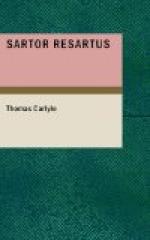“Man,” says the Professor elsewhere, in quite antipodal contrast with these high-soaring delineations, which we have here cut short on the verge of the inane, “Man is by birth somewhat of an owl. Perhaps, too, of all the owleries that ever possessed him, the most owlish, if we consider it, is that of your actually existing Motive-Millwrights. Fantastic tricks enough man has played, in his time; has fancied himself to be most things, down even to an animated heap of Glass: but to fancy himself a dead Iron-Balance for weighing Pains and Pleasures on, was reserved for this his latter era. There stands he, his Universe one huge Manger, filled with hay and thistles to be weighed against each other; and looks long-eared enough. Alas, poor devil! spectres are appointed to haunt him: one age he is hag-ridden, bewitched; the next, priest-ridden, befooled; in all ages, bedevilled. And now the Genius of Mechanism smothers him worse than any Nightmare did; till the Soul is nigh choked out of him, and only a kind of Digestive, Mechanic life remains. In Earth and in Heaven he can see nothing but Mechanism; has fear for nothing else, hope in nothing else: the world would indeed grind him to pieces; but cannot he fathom the Doctrine of Motives, and cunningly compute these, and mechanize them to grind the other way?
“Were he not, as has been said, purblinded by enchantment, you had but to bid him open his eyes and look. In which country, in which time, was it hitherto that man’s history, or the history of any man, went on by calculated or calculable ‘Motives’? What make ye of your Christianities, and Chivalries, and Reformations, and Marseillaise Hymns, and Reigns of Terror? Nay, has not perhaps the Motive-grinder himself been in Love? Did he never stand so much as a contested Election? Leave him to Time, and the medicating virtue of Nature.”
“Yes, Friends,” elsewhere observes the Professor, “not our Logical, Mensurative faculty, but our Imaginative one is King over us; I might say, Priest and Prophet to lead us heavenward; or Magician and Wizard to lead us hellward. Nay, even for the basest Sensualist, what is Sense but the implement of Fantasy; the vessel it drinks out of? Ever in the dullest existence there is a sheen either of Inspiration or of Madness (thou partly hast it in thy choice, which of the two), that gleams in from the circumambient Eternity, and colors with its own hues our little islet of Time. The Understanding is indeed thy window, too clear thou canst not make it; but Fantasy is thy eye, with its color-giving retina, healthy or diseased. Have not I myself known five hundred living soldiers sabred into crows’-meat for a piece of glazed cotton, which they called their Flag; which, had you sold it at any market-cross, would not have brought above three groschen? Did not the whole Hungarian Nation rise, like some tumultuous moon-stirred Atlantic, when Kaiser Joseph pocketed their Iron Crown; an implement, as was sagaciously observed, in size and commercial value little differing from a horse-shoe? It is in and through Symbols that man, consciously or unconsciously, lives, works, and has his being: those ages, moreover, are accounted the noblest which can the best recognize symbolical worth, and prize it the highest. For is not a Symbol ever, to him who has eyes for it, some dimmer or clearer revelation of the Godlike?




